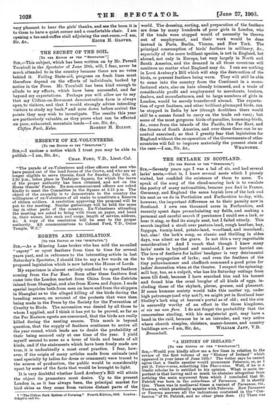EGRETS AND LEGISLATION.
[To THE EDITOR OF THE 'SPECTATOR."] SIR,—As a Mincing Lane broker who has sold the so-called " osprey " or egret feathers from time to time for several years past, and in reference to the interesting article in last Saturday's Spectator, I should like to say a few words on the proposed legislation which is now before the House of Lords.
My experience is almost entirely confined to egret feathers coming from the Far East. Soon after these feathers first came into the London market from China from the districts inland from Shanghai, and also from Korea and Japan, I made special inquiries both from men on leave and from the shippers in Shanghai as to the alleged killing of the birds during the breeding season, on account of the protests that were then being made in the Press by the Society for the Prevention of Cruelty to Birds. The accusation was denied by all those to whom I applied, and I think it has yet to be proved, so far as the Far Eastern egrets are concerned, that the birds are really killed during the nesting season. This much is beyond question, that the supply of feathers continues to arrive all the year round, which leads me to doubt the probability of their being secured only at one time of the year. I yield myself second to none as a lover of birds and beasts of all kinds, and if the statements which have been freely made are true, it is undoubtedly a most cruel practice. I fear, how- ever, if the origin of many articles made from animals (and used specially by ladies for dress or ornament) were traced to the source of production, the public would be considerably upset by some of the facts that would be brought to light.
It is very doubtful whether Lord Avehtny's Bill will attain the object its promoters most desire. Up to the present London is, as it has always been, the principal market for bird skins as they come from various distant parts of the
• "The Clifton Park Spit= of Farming." Fourth Efition, 1908. London: Sillopkin and Co. world.. The dressing, sorting, and preparation of the feathers are done by many hundreds of poor girls in London, who if the trade were stopped would of necessity be thrown out of employment, and their work would be done instead in Paris, Berlin, Vienna, and New York. The principal consumption of birds' feathers in millinery, &c., especially of the more brilliant species, is not in England, but abroad, not only in Europe, but very largely in North and South America, and the demand in all those countries will continue no matter what England may do. I can see nothing in Lord Avebury's Bill which will stop the destruction of the birds, or prevent feathers being worn. They will still be able to come into the country from the Continent in a manu- factured state, also on bats already trimmed, and a trade of considerable profit and employment to merchants, brokers, dealers, and manufacturers, and to large numbers of girls in London, would be merely transferred abroad. The exporta- tion of egret feathers, and other brilliant-plumaged birds, can be stopped in India by law (though doubtless there would still be a means found to carry on the trade sub rosa)- but some of the most gOrgeous birds-of-paradise, humming-birds, &c., come from the islands of the Pacific, the Far East, and the forests of South America, and over these there can be no control exercised; so that I greatly fear that legislation for England without the co-operation of the Governments of other countries will fail to improve materially the present state of






















































 Previous page
Previous page